Veganuary and the problem with vegans
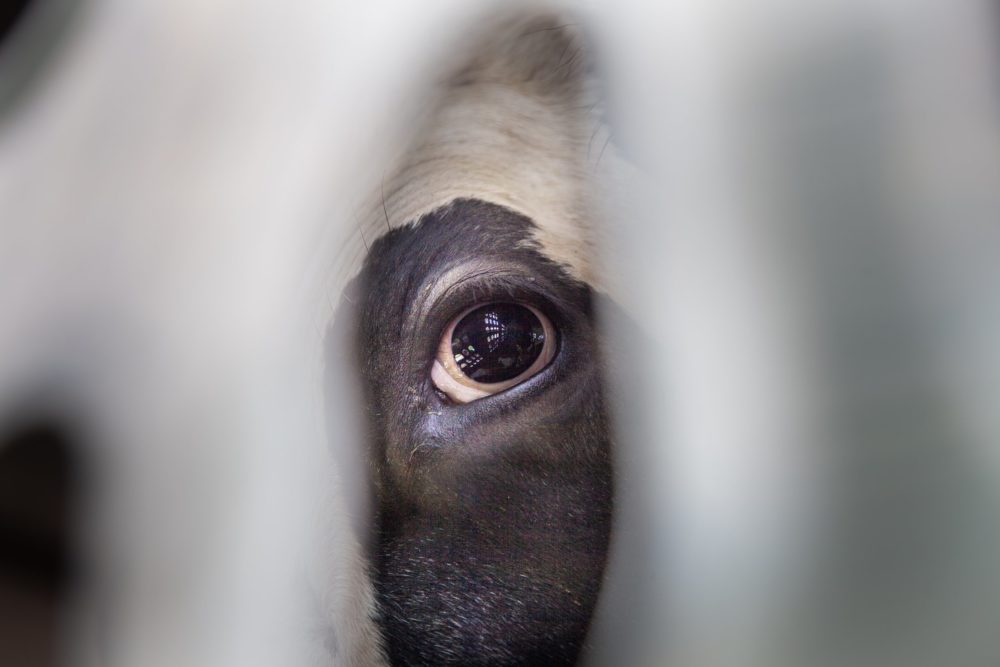
Stephen Price
Andrew RT Davies made headlines earlier this year with his controversial statements on Halal Meat – his expectation and aim being, undoubtedly, a pile-on.
Among his many mistakes while at the helm of the supposed Welsh Conservatives, this was perhaps one of his most misjudged.
The reaction, at least online, tended to be one of ‘live and let live’, and the pile-on was instead aimed at the man himself, such was his unpopularity and, to my surprise, people’s apathy towards the subject.
At the time, I stayed out of the debate, joining the many who seek unity among the growing divides, both home and away, especially in the face of rising Islamophobia and a mainstream press so very blinkered towards dehumanising Muslims
My take, had I had one back then, and perhaps surprisingly for a vegan, would have been both for and against Davies. And why, might you ask?
Because, whilst I wholeheartedly disagree with Halal slaughter, I’m also more than aware of the horrors of non-halal slaughter too.
Stoking division
Davies’ goal was quite clearly to stoke division, and draw in support from potential Reform voters, and not some benevolent attempt to improve the violent deaths of countless animals.
I’d hazard a guess that the owners of his local takeaway know his order off by heart, and you can rest assured most takeaways are more honest about how their meat was sourced than the pointless Red Tractor or ‘ethically reared’ style labels that caused Chris Packham to resign from his high profile RSPCA role last week.
“The question is not, ‘Can they reason?’ nor, ‘Can they talk?’ but rather, ‘Can they suffer?”
Jeremy Bentham.
Unlike so many people, especially those who pay for meat, I refuse to look away when presented with animal slaughter images online.
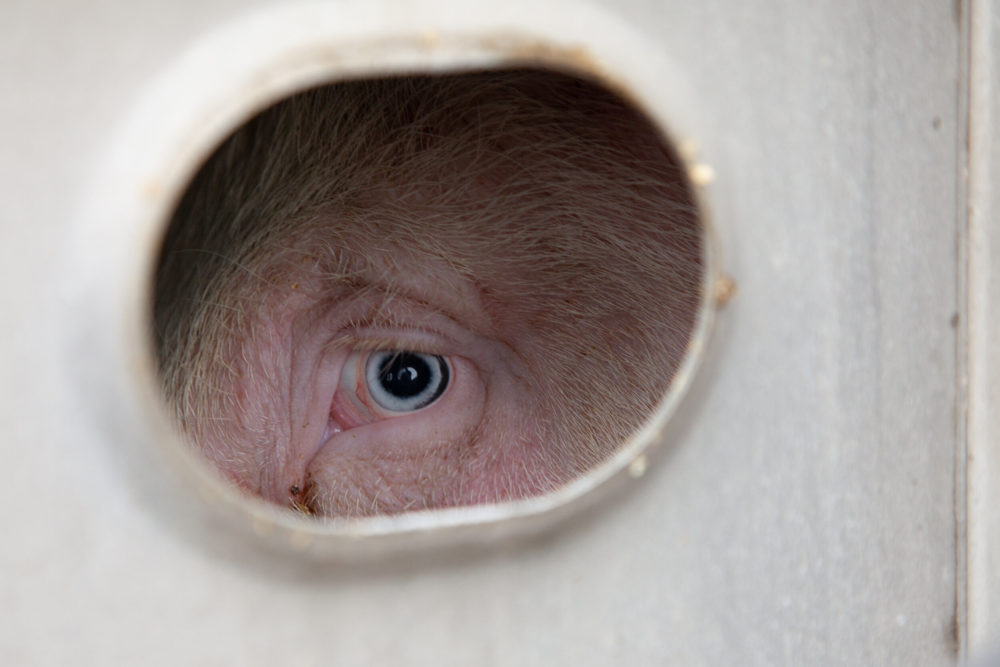
I’m haunted by images of cows lined up as those in front of them are killed, of bolts going into heads and pigs thrashing about on bloodied floors while their kind scream as they wait their turn.
Let’s not kid ourselves that slaughter is ever humane, however it’s carried out.
Halal
Every year in the UK around 1.2 billion land animals are slaughtered for human consumption. This includes over 1 billion chickens, 15 million turkeys, 14 million sheep, 2.8 million cattle, over 10 million pigs and almost 15 million sheep and lambs, and one estimate has suggested that 114m of these animals, including poultry, are killed using the halal method.
The value of the market could be £2bn a year or more.
“There is no fundamental difference between man and animals in their ability to feel pleasure and pain, happiness, and misery.”
Darwin
For most sheep and lambs this is by electronic stunning to the head or in poultry via a water bath electrified with enough power to make them unconscious but not to kill.
Another method of stunning that involves cardiac arrest is not allowed under halal rules.
In non-halal slaughterhouses, stunned animals are shackled and hoisted above the ground where a slaughterman “sticks” them, cutting their throat or inserting a chest stick close to the heart. Cattle and some sheep and pigs are stunned by a bolt through the brain before being killed.
“I have no doubt that it is a part of the destiny of the human race, in its gradual improvement, to leave off eating animals, as surely as the savage tribes have left off eating each other.”
Thoreau
Some European countries such as Denmark have banned slaughter without pre-stunning.
The RSPCA and British Veterinary Association are among groups calling for an end to slaughter without pre-stunning – a move that would mean an end to religious exemptions from European and UK legislation on this element of slaughtering, and also, say campaigners, an end to unnecessary suffering.
Campaigners are urging the government to introduce clear labelling to say whether meat is slaughtered by halal methods – an issue which the European Union is already studying.
Some Muslims warn that there must be an information campaign beforehand and those who are against any stunning question why, if labelling on the halal method is necessary, why is it not for animals slaughtered in other ways – by captive-bolt gun, gassing, electrocution, drowning or “mis-stunning”.
Gas chambers
So is non-Halal slaughter any better?
One thing that might surprise many Bacon lovers, is the fact that pigs in the UK are often killed in gas chambers.
A distressing article from the Guardian last year laid bare the suffering involved, with undercover footage showing pigs in groups of five or six being mechanically herded into a cage and then lowered into a Butina gas chamber in a ferris wheel-like system.
“The time will come when men such as I will look upon the murder of animals as they now look upon the murder of men.”
Leonardo Da Vinci
Campaigners say the pictures – the first of their kind to be obtained in a UK abattoir – show the “utterly inhumane” nature of using CO2 to stun pigs before being killed.
But the pork industry says its use is recognised as the most welfare-friendly method available, and says alternatives are being sought.
The pigs are clearly distressed as the gas concentration increases, with one still kicking after more than three minutes.
“The pigs in the video react to the first inhalation of carbon dioxide with fear and obvious discomfort,” said Donald Broom, an animal welfare professor at the University of Cambridge.
“They try to escape but cannot. The gasping can be seen in all pigs where the mouth is visible. Gasping indicates poor welfare. The period of poor welfare continues until the pig loses consciousness.”
And what of the other animals? A bolt to the head lined up among the smell of death. A stunning, a slice to the throat, it’s all kept behind closed doors for good reason – even farmers themselves don’t want the blood on their hands.
Chickens too, face a similar fate to pigs in gas chambers.
The worst horror films have nothing on the meat industry.
Land use
Research published in the World Resources Institute in March 2021 found that two of the main products responsible for deforestation are beef and soy, the latter primarily used for animal feed before anyone jumps on that.
The EU, as net importer of these products, is facing increased calls to address the impact of such imports on the environment and on animals to ensure coherence between EU trade policy and the EU Green Deal.
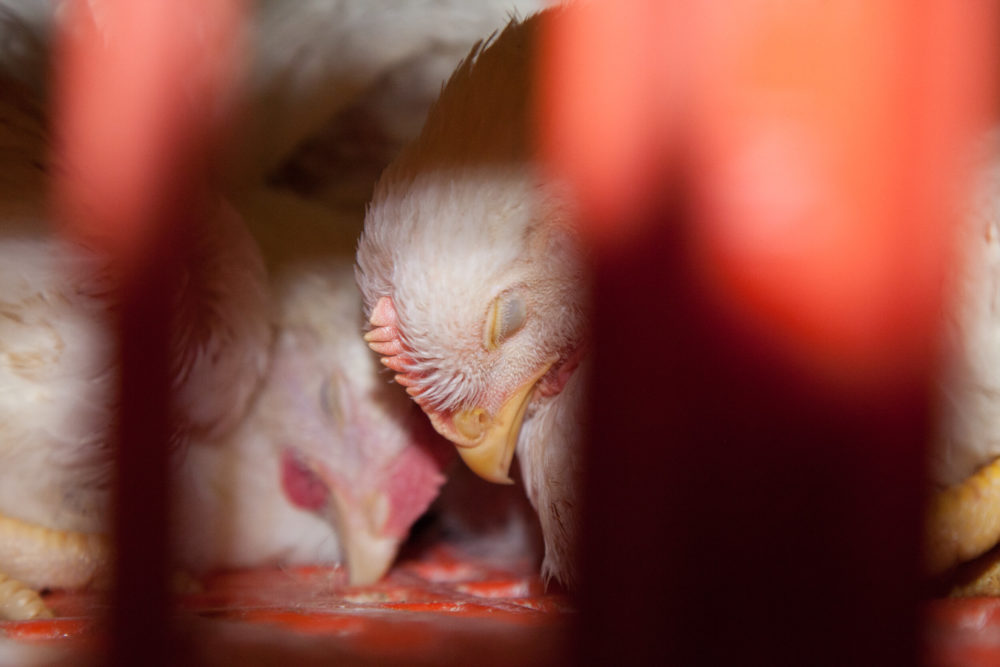
But it’s out of sight out of mind – the Amazon rainforest in particular on its way to looking like much of the UK from on high, with our barren ecosystems appearing just fine since they just so happen to be green.
But like our fetid chicken-shit-filled rivers, it can only stay out of sight for so long.
“As long as there are slaughter houses there will always be battlefields.”
Tolstoy
According to research by Global Forest Watch, the total loss of tropical forest increased by 12% overall between 2019 and 2020. Agriculture is the top source of worldwide deforestation (40%), and among the top commodity-drivers of deforestation, beef holds the first place.
Overall, beef is responsible for 36% of all agriculture-linked forest-replacement.
The huge responsibility borne by the beef industry is due to the conversion of forests into cattle pasture, which amounted to 45.1 Millions hectares of lands deforested between 2001 and 2015 – a rate that is five times higher than for any other analysed products.
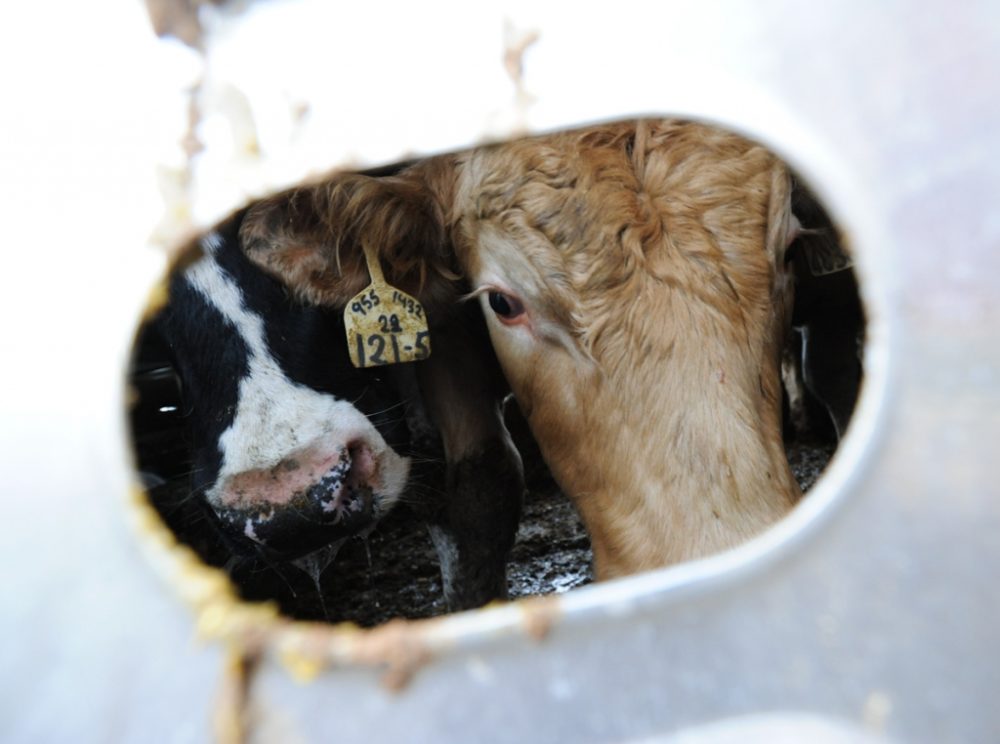
With nature in freefall and our climate in crisis, addressing the impact of our diet might seem an obvious option, but we’re all turning a blind eye or pointing fingers and expecting change to come from on high.
But collectively, if we all demand better and demand less, change will come.
A life for a snack
Whether it’s a slit throat with a prayer or the flick of a switch at a gas chamber, a life lived on a welsh hillside or in a sunlight free barn, the fact remains that no animal wants or deserves to die a brutal death to be someone’s snack.
And not even a snack in so many cases – the amount of food we waste year on year is eye watering. Surely an animal’s life is worth more than just being binned?
Being kind to all kinds shouldn’t be seen as militant, or extreme, but the norm.
The boring vegan jokes and attacks on people calling for compassion hint towards society knowing that we have to do better, we have to be kinder, and we are hopefully too intelligent to keep turning a blind eye any longer.
Injustice
I have much more respect for a farmer and indeed a slaughterhouse worker than I do a self-professed-animal-lover picking up a ‘joint’ from a shelf, or flesh disguised as a nugget in a ‘happy meal’ for their child.
Sanitised images of happy cows and the like do an injustice to the poor animals that simply did not want or deserve to die in the billions each year to satisfy our insane greed for more at any cost.
“Nothing will benefit human health and increase chances for survival of life on Earth as much as the evolution to a vegetarian diet”
Albert Einstein
I wonder how many of us, us animal lovers, would actually eat meat if it meant holding the knife ourselves while looking into their eyes?
But it’s fine because we don’t have to. We can employ cheap, often foreign, labour to do the work for us.
Abattoir work has been linked to multiple mental health problems, – one researcher uses the term “Perpetrator-Induced Traumatic Syndrome” to refer to symptoms of PTSD suffered by slaughterhouse workers.
One told the BBC in a moving article: “I personally suffered from depression, a condition exacerbated by the long hours, the relentless work, and being surrounded by death. After a while, I started feeling suicidal.”
It’s as simple as picking up oat milk from a shelf or switching an ingredient here and there to be kinder to animals and the planet.
What part of our human nature thinks it’s acceptable to brutalise and kill innocent loving, vulnerable, kind and precious animals for food products when our nature should be to protect them, to keep them from harm?
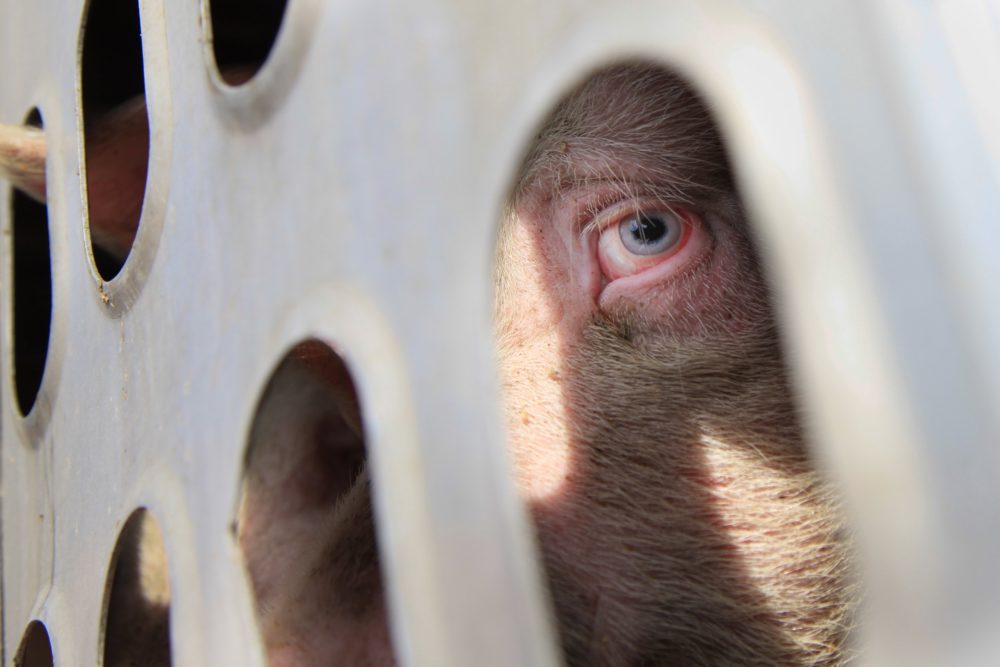
Each cow, chicken or pig is as individual, as curious about the world, is as deserving of compassion as our dogs and cats.
The usual response is live and let live, for people to respect others, but that is absurdly what vegans are asking for.
“To my mind,” he said, “I hold that the more helpless a creature, the more entitled it is to protection by man from the cruelty of man.”
Gandhi
With the facts and figures on land use and CO2 coming in veganism’s favour, whatever science you’re looking at, for me it comes down to a simple truth – animals value their lives as much as we do, they feel pain and fear and love just as we do. Who am I to take all they have from them?
The problem with vegans is that they turn a mirror to the status quo by simply calling for an end to harming animals.
Compassion is to be ridiculed. Caring for the lesser is to call for a bacon joke.
“Whenever you find yourself on the side of the majority, it is time to reform (or pause and reflect).”
Mark Twain, Notebook, 1904
Claims of vegans feeling superior to meat eaters are hypocritical and absurd, in that vegans are the only group that see themselves as equal to, not above animals.
I don’t expect to change anyone’s mind when it comes to this polarising subject, but I do wish the ‘live and let live’ advocates would simply mean what they say.
Peace begins on our plate, and I wish every being on this earth a peaceful 2025. Truly.
Support our Nation today
For the price of a cup of coffee a month you can help us create an independent, not-for-profit, national news service for the people of Wales, by the people of Wales.






It’s probably been said before, but Davies is likely ke a gutter level of Musk and Farage
It gets tedious when people use ‘gutter level’ as shorthand for ‘I disagree with them.’
Great article. Well said.
People don’t like the truth by the looks, Jack.
That’s a strange thing. You see, I have shared the Truth that is the cure and prevention of all needless and preventable suffering and death: The Truth of the Importance of Life itself, with over a million people. For the record, almost every single person who is not attempting to lead others agress with it and they frequently articulate clear and concise evidence and examples of this truth proving true for all life at all times. Then on the other hand those that were attempting to lead others dismissed and stifled this truth and withheld the knowledge of it from… Read more »
An excellent article Stephen. Whilst many people will always eat meat it’s good for us to be reminded every so often of the full horror that the industry entails. Whatever we eat we should all take full responsibility for the production process. Picking up on one of your themes, maybe abattoirs could offer guided tours for meat eaters where people could try out despatching a few cows or pigs themselves, a bit like the pick-your-own strawberry farms. Who could object to people educating themselves and taking part in the process of how food arrives on our plates? I’d be genuinely… Read more »
Great comment. I(as a vegan) have always said that meat eaters should be prepared to kill their own food.
I agree with you and I put that into practice but I also think that we who eat meat should realise that for us to eat meat an animal has to die and meat should not be wasted or be produced ‘on the cheap’.
It’s a strange thing when someone tells you that you have high intelligence and goes on and on anout it, and then tells you that you have lost your mind when it comes to the animal welfare issue, and you tell them that they are making a decision without actually even viewing the available evidence, show it to them, and then have them scream in horror by viewing for less than a second that you have scared their mind with a bad memory. I am not out to hurt the minds of my peers. You and Anon have the part… Read more »
“if slaughter houses had glass walls – we’d all be vegetarian”
Paul / Linda McCartney
“Compassion for animals is intimately associated with goodness of character, and it may be confidently asserted that he who is cruel to animals cannot be a good man.”
― Arthur Schopenhauer, The Basis of Morality
Well, that was sad, I was hoping for some kind of attempt to deal with the ‘holier than thou’ attitude so prevalent among vegans, but no, just more of the same… It was the same 35 years ago when I worked in a vegetarian bakery, out of over 100 products we had 3 that were not vegan, vegans would come in all day every day to eat our delicious food, and roundly condemn us for having those 3 non vegan products… Most (other) vegetarians I knew were also heartily sick and tired of the constant haranguing, we’d tell them to… Read more »
I had a 18′ sign set up on the lawn of city hall in Los Angeles, directly across the street from the police department headquarters for about 3 months back in 2011. It had all of these quotes on there and more and I have seen and heard the horror time and time again. While the caring for and loving and not needlessly harming animals is true, veganism has absolutely nothing at all to do with why it is, never has, and never will and there is no such thing as a person being a vegan. Veganism is the sauce… Read more »
wtaf?